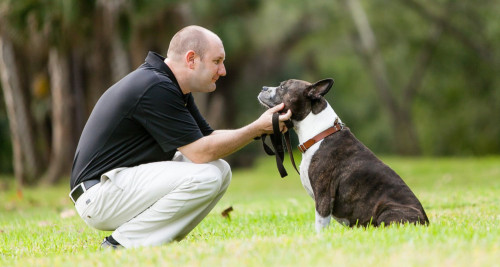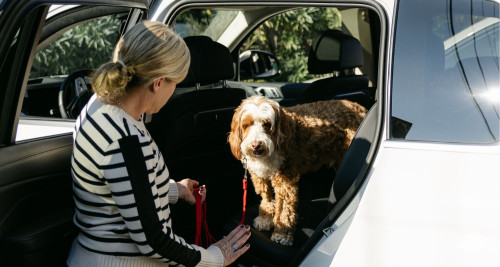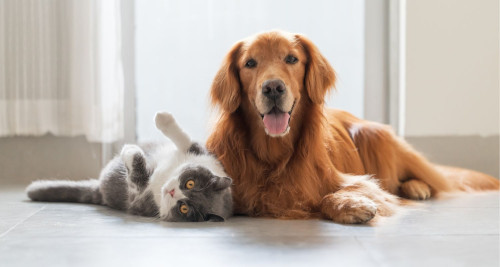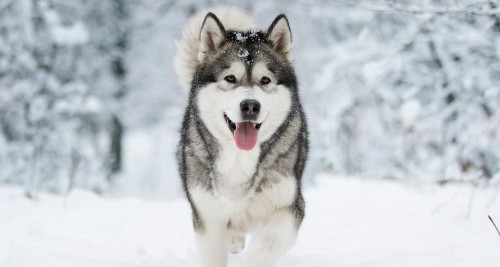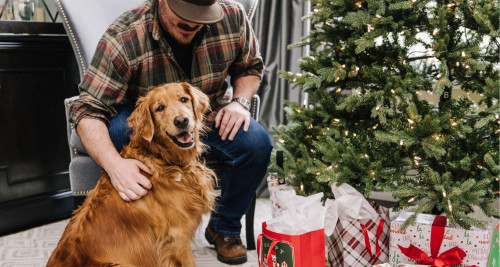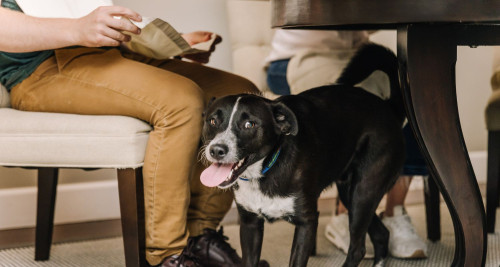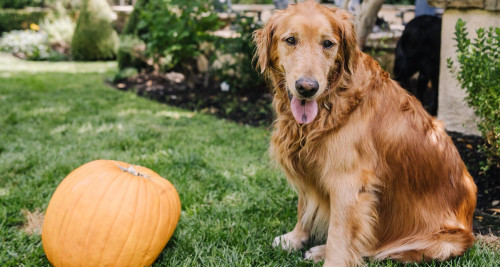Bull Dog
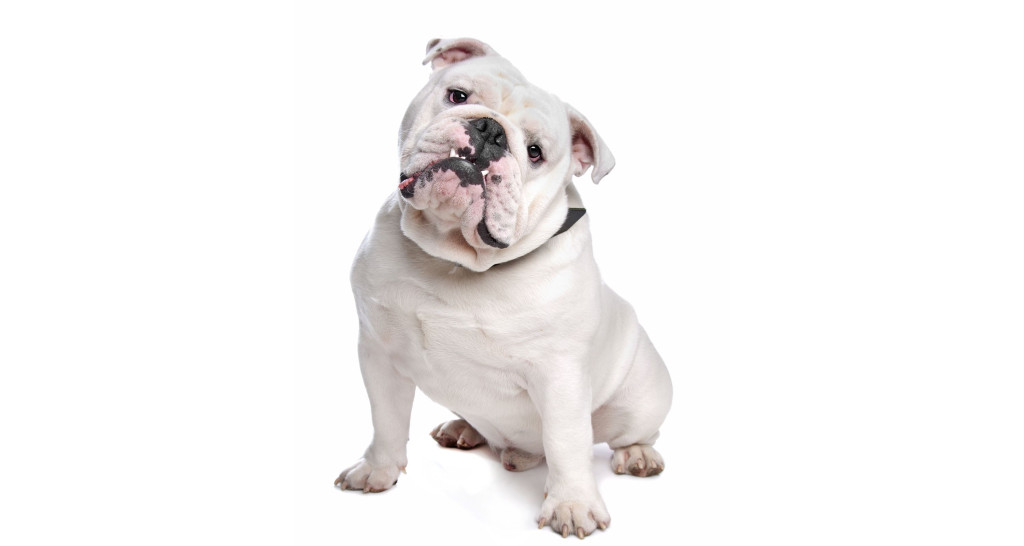
Breed Traits and Characteristics
According to the American Kennel Club, here are some breed characteristic you can find in Bull Dogs.
- Height
14-15 inches
- Weight
50 (male), 40 pounds (female)
- Life Expectancy
8-10 years
- Coat Type/Length
Smooth/Short
-
80 Affectionate with Family
-
60 Good with Young Children
-
60 Good with Other Dogs
-
80 Trainability Level
-
60 Energy Level
-
40 Barking Level
-
60 Shedding Level
-
60 Drooling Level
History
Bull dogs were inducted into the American Kennel Club in 1886 and their main purpose was bull baiting. This is why they have a low center of gravity and an under bite (making it easier to bite, grip and hold, while still able to breath). Their wrinkles kept the blood from the bulls from flying into their eyes. In bull baiting, numerous dogs were used (with wagers placed on each) pitting the dogs against a tethered bull. The dog that grabbed the bull by the nose and pinned it to the ground was the winner.
Bull dogs were originally bred in England dating back to the 16th century. When bull baiting was outlawed in 1835 (the Cruelty to Animals Act), the Old English Bulldog was crossed with the Pug to create a more affectionate family pet. The Bull dog retained its protective and fearless nature, but aggressive and ferocious tendencies were removed from the breed. When the English brought their bull dogs to America, the breed was incorporated under the laws of the State of New York on November 29, 1904.
Now bull dogs are known for being lovers not fighters!
The Bull Dog
The average bull dog is 12 – 15” in height, weighs 40 – 50 pounds and generally lives between 10 – 12 years. A bull dogs coloring is usually red, fawn, white, brindle and piebald (pigmented spots on an unpigmented white background) or a combination thereof. There are usually thick folds of skin under their eyebrows, jowls under their neck and an under bite with an upturned jaw. Their tail is naturally short and either straight or screwed.
Bark Busters has trained hundreds of bull dogs because behind that affectionate nature is a stubbornness and willfulness to be in charge! Early training and socialization and constant leadership is suggested or you will have a dog that is “bull-headed”!
Bull Dog Management
Even though this breed looks grumpy, a bull dog’s personality is by nature lovable and sweet. However, it’s tenacity and resolve mean that it's difficult to change his mind once he decides to do something. It is important that you establish right from the start who is the leader of the pack, or else he will try and take control. They respond well to the Bark Busters style of training which is based on all natural and positive techniques.
Remember that dogs learn how to communicate with each other as a member of the pack on their Mother’s teats. Their Mom gets them to behave not by using treats or prong and shock collars. That is exactly what the Bark Busters style of training teaches these dogs – how to communicate between human and dog. We teach you how to set rules and boundaries early on. Good training involves repetition, positive reinforcement and consistency. You have to let your bull dog know that you mean what you say.
The good news is that although bull dogs are slow to mature, once they have grown up, they seem to stay out of trouble. We have seen bull dogs with serious cases of food guarding, which is why we don’t recommend feeding them around children or other pets.
Although most bull dogs generally get along with other pets in the family, we have seen many bull dogs act aggressively toward other dogs of the same sex. Others don’t seem to get along with cats. It takes a tremendous amount of serious teasing to make this dog mad, but once he is, look out!
Most bull dogs are friendly with strangers, but some can be politely reserved.
The bull dog gets along best in temperate climates. They may want to be couch potatoes, snoring away, but you need to get them up and exercising every day since the breed can be prone to obesity. However, remember that bull dogs are intolerant of warm weather, and may die if overheated. Too much exercise or stress can make it difficult for them to breathe.
As with other breeds, bull dogs seem to have a face that some people find adorable, whereas others can’t take their drooling, snorting, wheezing and farting! Even though they are not barkers, you can hear their “dog noises” from far away!
Bull Dog Breed Facts
Points of Interest
- During World War II, the Bull dog was often compared Prime Minister Winston Churchill and his stance on Nazi Germany.
- Bull dogs often have to be delivered via C-section because their heads are too big to fit through the birthing canal.
- Bull dogs are brachycephalic (a condition caused by their short snouts), which leads to their snoring and drooling.
- Bull dogs are the mascot for many universities and sports teams, like Yale University and the U.S. Marine Corps.
- They have suffered the most airline deaths because of their respiratory issues. Don’t fly in extreme temperatures,
- Many Hollywood stars own bull dogs including Leonardo DiCaprio, Reese Witherspoon, Martha Stewart, Hugh Jackman and more.
- Bull dogs can’t swim. Their big heads and short legs make it hard to float. Be very careful with bull dogs around water especially if you have a pool or live near a lake.
Personality and Temperament
Bull dogs love kids, which makes them great for families. Loving as they are, a bit of the old- world bulldog endures, which also makes them well-suited for the night shift guarding the house. Because of their gregarious nature, you’ll find bull dogs to be people magnets wherever they go.
Bull dogs love to snuggle under the covers with you…don’t try and tell them they are not lap dogs!
- Affectionate, easy going
- Not much of a barker but can be a great watch dog
- Great with kids
- Considered a companion dog by the AKC
- Sensitive, can mature slowly
- Prone to comical and silly antics
- Dignified but amusing
Capabilities
- The bull dog was bred to be strong, powerful, effective, determined and assertive. It’s not typically an agile breed and does have some limitations to its capabilities. Having said that, we see many bull dogs riding skate boards, surfboards and jogging along with their humans and even playing football. This will depend on the personality and energy levels of your particular dog.
- It’s always wise to begin any exercise regime with short bursts of activity, making sure that you build your dog’s exercise routine up gradually.
- Shy personality types might shun public life, preferring to stay at home where they feel safe and secure, surrounded by things they know. Outgoing and confident personalities will want to join in outdoor activities and will more than happy to join in most activities.
- Just remember to monitor your dog’s activities and don’t let them overdo it. After all they need you to look after their welfare.
Bark Busters Trainer Jeff Drier on Bull Dogs
Whenever we work with a bull dog owner, we always work on helping our client’s bull dog build a positive association with getting their face cleaned. Building the positive association before there are problems is much easier than starting when there are already problems. Depending on how active the dog is and how dirty it likes to get, we suggest they practice daily. Here’s a process that has been successful for many clients.
If the dog likes treats, having a supply of small stinky treats or tiny pieces of cheese will be helpful. Start by calling the dog to you for petting. Start petting under the chin. Go slowly and talk to your dog in a calm loving tone of voice. Slowly bring your hands up to the cheeks and gently probe the folds of its cheeks with your fingers. You can occasionally give a treat, if the dog remains calm and non-reactive. Continue gently probing the folds working up on both sides of his face. Give him lots of calm praise as you proceed.
If the dog does react slow down and work outside the folds, gently stroking the cheeks but not going into the folds. Slowly work into the folds as you he lets you and stays unreactive.
Once he is used to being touched, bring out what you will be using to actually clean his face. Cotton balls or a soft cloth are good choices. Show him the item and when he leans in to sniff it, give him a treat, then put it away. Repeat that a few times until he doesn’t react when he sees the cotton or cloth.
Once he is ok seeing what you will be using, start by using it to pet him and stroke his face. Don’t immediately start probing unless he is completely fine with you doing it. Get him used to the feel of the item. Use the treats to help him build that positive association. Give him lots of calm praise as he stays un-reactive.
Next you would start cleaning. Dampen the cotton or cloth, give him a treat when he sniffs the cloth and gently start to clean the folds. After cleaning, take another dry cotton ball or cloth and thoroughly dry the insides of the folds. Go slow, give yourself and your dog plenty of time.
By starting before there are problems, and building the positive association with having their face cleaned, the likelihood of infection is greatly reduced. Dogs love getting attention and affection and very often face cleaning can turn into a great bonding time. Once established this should be done daily and if your bull dog is susceptible to getting dirty than it might need to be done more than once a day. Have fun and if you need help contact your local Bark Busters Trainer.
Bark Busters Trainers Marc and Karen Deppe on Bull Dogs
As a Bark Busters trainer, I spend my days working with a huge variety of breeds with an equally wide array of behavioral issues. Like humans, each dog has a unique personality that may or may not match a breed stereotype. There are however, some traits that just seem to fit certain breeds.
Bull dogs (in my experience) are affectionate, strong, curious, tough and can be very, very stubborn. When training a bulldog, it is critical to have the resolve required to follow through with training until the dog complies. This doesn’t mean it will take months to train a bulldog. I normally see huge improvements with bull dogs in the first training session. That said; it often takes more time, and determination and lots of energy to get the dog to comply with each training exercise. It’s definitely challenging but it makes the behavioral transformation that much more rewarding!
The similarities I see in bull dogs extend beyond breed traits. There are behaviors that seem to repeat over and over with many of our customers. These include:
- Pulling on lead. This includes pulling simply to lead their human, pulling toward other dogs and animals and sometimes toward vehicles or just about anything. To resolve leach pulling in a bulldog, it’s critical to work with the owner to gain full control/respect with the dog inside before starting leash work. The exterior stimuli make it difficult to address a bulldog’s behavior that was already getting his own way inside. Get your wins inside BEFORE working on leash training. Even with great interior control, it often takes some effort to get a bulldog to give up the leadership role when on lead and to gain the focus required.
- What is it about vacuum cleaners?? I have had several bull dogs that just really hate vacuum cleaners. They literally go nuts and attack (the vacuum, not the operator) whenever it comes out. Sometimes, it need not even be turned on. Fortunately, this is relatively easy behavior to remedy and it generally fully resolved during the first training session. The resolution always involves teaching the owner how to communicate effectively with the dog using binary input (teaching the dog how you will indicate, what it is right or wrong).
- Because of their strong nature, sibling rivalry issues are common with bull dogs. If the owner is not in firm control as leader of the household, the bulldog is likely to step into the role. This results in the bulldog correcting the other dogs and sometimes it can be very aggressive and quite daunting for the owner to address without professional help. This behavior is typically fully resolved when the owner fully dispels any misconception in the dog’s mind of any notion that the leadership role in the house is available.
Bull dogs are challenging to train but also incredibly rewarding to own. They are lovable, cuddly balls of energy that when properly trained are wonderful family members. Don’t be discouraged by their stubborn nature! Embrace it and have some fun with training! Learn more about Bark Busters Trainers Marc and Karen Deppe.
Training Your Bull Dog
The Right Training for Your Bull Dog
This very lovable breed is trainable, but you must be patient and be prepared for their over-enthusiasm when trying to please you. To begin with, start out slow, with small and brief exercises each day and build on these depending on your dog’s personality and energy levels.
Making sure you allow lots of stops for your dog to have a drink of water.
It is not wise to give your bull dog too much to do in the beginning or you could tire him, which could lead to your pet trying to avoid any efforts towards training in the future.
The best approach is to keep everything you do calm and your body movements to a minimum as this breed is easily distracted.
Best to initially start out on a leash around the home and advance to some off-leash training as your dog learns what you want.
They definitely have the intelligence to learn anything if you have the patience but you have to understand the breed’s capabilities and personality to understand what is possible.
As previously mentioned, the bull dog does not like the heat and it can run out of steam quite quickly on a hot day. It is best to train them during the cooler parts of the day and only in short spurts.
Your local Bark Busters trainer is very experienced at helping you with the training of your bull dog and knows the best way to get the most out of your pet.
Our training is based on communication, no harsh methods and more than 30 years-experience in dealing with all breeds. We can teach your bull dog basic obedience (sit, come, stay) as help you to overcome tougher issues like aggression, sibling rivalry, separation anxiety and leash training.
Do’s and Don'ts of Training for Bull Dog Owners
- Don’t yell your commands, your dog has excellent hearing
- Don’t use a gruff voice if you are asking your dog to come to you.
- Do use the right tone of voice; normal tone for commands, high tone for praise and firm tone to address any unwanted behavior.
- Never strike, hit, poke or prod your dog
- Never drag your dog back to the ‘scene of the crime’. You must see them in the act and address the behavior without being physical.
- Don’t be inconsistent as dogs hate inconsistency.
- Do keep your exercises short.
- Do praise your dog when it does what you ask of it.
- Do be patient, remember your dog does not speak English, it Speaks Dog!
Separating from Your Dog
Most bull dogs just want to be where you are, but that can lead to situations where separation might rear its head. So practice exercises where you separate from your dog for a while, to ensure that they learn to cope being left alone.
Many people nowadays sleep with their dogs and we don’t have any issues with that, providing that your dog’s behavior is not related to this practice. Even so, it is still wise to make sure that your dog can cope alone some nights, so your dog is used to being separated and learns how to, every now and then, be without you without feeling anxious.
Children and Bull Dogs
Although bull dogs are known to be patient and loving with children, never assume this. Never introduce ANY dog to a child when unsupervised. Remember that the bull dog was originally one of the bully breeds that received a bad rap but was later classified as a “nanny dog”. Why? Because they are generally so good with children.
All dogs, regardless of what breed they are should receive some basic education about how to behave around children. Likewise, children also need some guidelines on what is permitted when it comes to interacting with the dog or games to play.
Introduce your child to your bull dog with a watchful eye on both. Both puppies and children can be unpredictable in how they react to certain situations and do not understand the consequences of their actions. Both can make innocent mistakes that are costly and dangerous. Children often think they can poke or prod a dog and then act surprised when the dog rebels. Children should be taught to never pull, hit or rough house with a puppy. A bulldog puppy that is abused can develop phobias and psychological scars that can be carried into adulthood.
With the proper training, your bull dog will more than likely be a great companion and loyal watch dog with your children.
To be on the safe side, never leave dogs and children alone together. They always need supervision.
Bull Dog Common Behavioral Problems
Bull dogs are in general well-behaved, but when we are called in, it usually for one of the following reasons:
- Dog aggression
- Over-exuberance
- Barking at visitors
- Jumping on visitors and humping them
- Pulling on the leash
- Sibling rivalry
- Chasing the cat
- Jumping on children and family members
Remember what the bull dog was bred to do. It was originally bred for bull baiting and had to be tough, determined and tenacious to confront something as formidable as a bull.
Puppy Play
Just because a bull dog is not up for running marathons doesn’t mean he doesn’t like to play. In fact, many bull dogs are extremely playful!
Every dog likes to play differently, depending on their breed and their individual personality. But once you figure out which games make your dog happy, you can use them to give him exercise, mental stimulation, and more.
Most bull dog pups enjoy being active, playing games, and participating in activities like fly ball, agility, tracking, and obedience. Playing in shallow water can be fun for your bull dog, too! Although not a retriever, many bull dogs even love to play Fetch.
Playing games will keep your bull dog more confident, more independent, and less scared when you are not around. It keeps them feeling more secure in general which leads to a happier pup!
They are more active on cooler days, so keep them cool during the hot weather.
Also be sure that your puppy is fully immunized before venturing out. Speak to your vet who can advise you as to what immunizations are required.
Connect with Us!
Need help training your Bull Dog? Call 1-877-500-BARK (2275)or enter your zip code.
Bull Dog Health
Common Illnesses and Injuries
Bulldogs have personality and physical traits that may make them more prone to certain conditions—the short snout of a Bulldog makes it more sensitive to warm weather and prone to heat stress. The wrinkles and folds of a Bulldog also make it prone to skin conditions.
Bull dogs have a tendency towards infections in the folds of skin on their faces if they are not kept clean and dry. This can be challenging so it’s important to establish a routine as soon as possible. This is certainly an instance when an ounce of prevention is worth a pound of cure. More than a few times we’ve been asked to help when bull dogs have developed infections and the folds needed to be cleaned and medication applied. The infections cause the area to become very sensitive and many of these dogs will become reactive to attempts to clean their faces.
At any stage of life, here are some of the most common injuries and illnesses you should be aware of when bringing home a Bulldog:
- Bone and joint problems
- Hip and elbow dysplasia
- Eye problems
- Bladder and kidney stones
- Respiratory conditions
- Heart disease
- Skin conditions
- Cancer
- Dental abnormalities
- Reproductive conditions
Genetic Health Concerns
Like many popular breeds, the Bulldog has its fair share of hereditary based issues, like hip and elbow dysplasia and heart conditions.
Most reputable breeders now have their breeding stock checked and scored for these hereditary ailments by a veterinarian. You can request proof that the puppy you are purchasing comes from parents that have been checked for these issues.
Because many other health issues are also hereditary, you should do some research on the ancestry of your puppy and any health issues of that particular breed.
Many rescue organizations also check for common-ailments before making them available for adoption.
If you are ever concerned about your dog’s health, your local veterinarian is a great resource—no matter how small the question.
Tips For Every Dog Owner
Hear from Bark Busters Clients Who Have a Bull Dog
Transform Your Bull Dog’s Behavior: Fill Out Our Form and Discover the Value of Expert Training Today!
Verify your zip code and submit the brief form. We’ll be in touch within 24 hours to go over training options for your dog. Ditch the stress of group classes and choose tailored, in-home training that works for you.
- 99.7% 4 or 5 stars 99.7% rate their experience with Bark Busters as 4 or 5 out of 5 stars.
- 99.6% Would Recommend 99.6% would recommend Bark Busters to their friends and neighbors.
- 99.5% Dog Responded 99.5% think their dog responded well to the training.
Need Dog Training Assistance with Your Bull Dog? Find Your Local Trainer Now!
CALL TODAY 1-877-500-BARK (2275)
